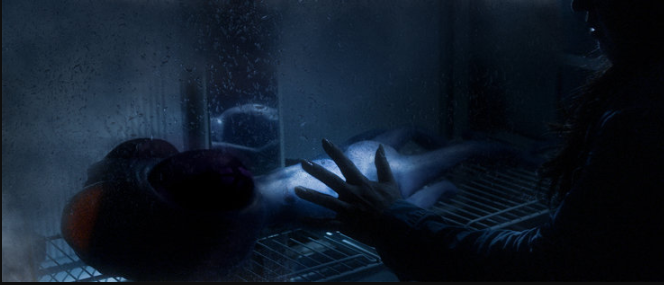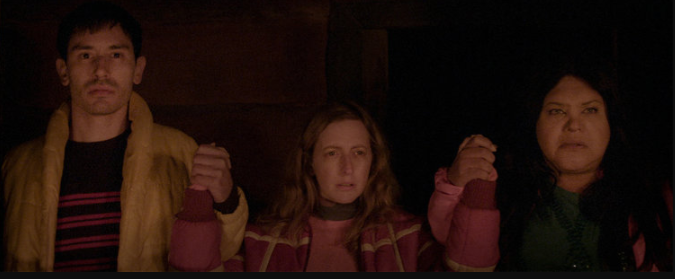Exploring Queer Alienation with a Literal Alien
Review of A Brief Story from the Green Planet at Three Dollar Bill's Seattle Queer Film Festival.
Written by TeenTix Newsroom Writer Kai Craig and edited by Teen Editor Tova Gaster.

A Brief Story from the Green Planet is a beautiful— and jarring— film. It follows three close friends on their journey through the Argentinian countryside to return an alien back to its place of origin. The movie is full of lovely, sweeping shots that are full of fondness for the location and the characters and is generally a thought-provoking and well-put-together piece.
The film follows Tania (Romina Escobar), a young transgender woman mourning the death of her grandmother. Tania calls upon her two friends to travel to her grandmother’s home with her. There they discover that, prior to her death, Tania’s grandmother was housing and caring for a small blue extraterrestrial. The creature is roughly three feet tall, with enormous, bulbous eyes and a slight frame, a standard cinematic alien. The group takes it upon themselves to return to the creature to whence it came. Through various encounters with ex-bullies and lovers, a hospital scare, and even an odd, metaphorical mob, the trio confronts their fears and past traumas while simultaneously dragging an impossibly large suitcase containing the alien through the countryside of Argentina. Despite these challenges, the three are able to successfully find their way.

One of the things I found most touching about this film was how these characters were willing to do absolutely anything for their friends. Whether it be fending off the threatening men that seem to follow Tania wherever she goes, or confronting the group attempting to prevent Pedro (Luis Sodá) from dancing, these three would walk to the ends of the earth for each other. They, along with the alien, are united by a deep sense of otherness and invisibility from society. Daniela (Paula Grinszpan), works a dead-end job and is freshly dumped, Pedro has no job and spends all his time dancing, and Tania performs in a dingy disco drag bar. All appear to have the stereotypical mediocre messy apartment of a young poor person. Though they have attempted to prove themselves as useful members of society, as queer people they are still isolated and abandoned by the very society they make their homes in.
The existence of the alien, strangely, is not a surprise to anyone who encountered it during the film. Many people they encounter seem to even be comfortable with the creature: one woman goes as far as to breastfeed it, saying that it “must [have been] hungry”. The shock value of this scene emphasized just how comfortable everyone seems to be with the alien. These scenes of quiet acceptance and intimacy with the creature help to demonstrate the director’s intent of displaying the healing and acceptance of those who are so often sidelined and isolated from society.
This piece follows a structure similar to many classic coming of age movies. On their journey, the three begin to reflect of the nature of their lives, through discussions of past traumas and the nature of existing as queer adults. They all come to peace with themselves in different ways. Daniela is able to find deeper meaning in her seemingly mundane life, as she, with the help of mysteriously painted black and white figures, is able to lead the group to their final destination, the landing place of the alien.

Tania is finally able to find peace from the constant threats she faces every day as a trans woman and fulfill her familial “legacy” when she and the alien are slowly lifted into the sky as Pedro and Daniela look on in awe. On their journey, Tania has a vision that she is violently attacked by one of the men that constantly trail her shadows. The vision ends with her facedown and alone, in a parking lot. It feels as though this is what Tania sees as her eventual fate. In ascending towards the sky with the creature, Tania is able to give herself an ultimate closure: an exit on her terms.
Director Santiago Loza has a skill for abrupt yet fascinating transitions. Throughout the film, scenes of wild dance parties melt seamlessly into the quiet countryside. Loza takes hold of each scene with an incredibly dramatic soundtrack that calls the viewer's attention to the sharp contrast of setting, in ways that the pictures do not, while simultaneously filling each scene with feeling.
In addition, this piece was chock full of emotion, on every level. From the opening scene of the characters’ apartments the viewer is given an intimate and loving view into their lives. Through sweeping, vivid shots full of light and warmth, the viewer is pulled into the scene, almost as if you are on the journey with them. Under the guise of a basic film concept, Loza has created a very moving and beautiful film about love, queer identity, fitting in, and even aliens.
Lead photo caption: Film still from A Brief Story from the Green Planet
The TeenTix Newsroom is a group of teen writers led by the Teen Editorial Staff. For each review, Newsroom writers work individually with a teen editor to polish their writing for publication. The Teen Editorial Staff is made up of 6 teens who curate the review portion of the TeenTix blog. More information about the Teen Editorial Staff can be found HERE.
The TeenTix Press Corps promotes critical thinking, communication, and information literacy through criticism and journalism practice for teens. For more information about the Press Corps program see HERE.

